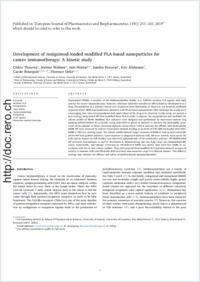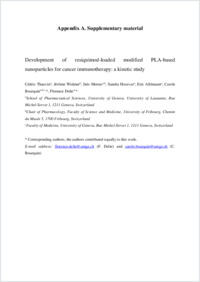Development of resiquimod-loaded modified PLA-based nanoparticles for cancer immunotherapy: A kinetic study
- Thauvin, Cédric School of Pharmaceutical Sciences, University of Geneva, University of Lausanne, Geneva, Switzerland
- Widmer, Jérôme Chair of Pharmacology, Faculty of Science and Medicine, University of Fribourg, Switzerland
- Mottas, Inès School of Pharmaceutical Sciences, University of Geneva, University of Lausanne, Geneva, Switzerland - Chair of Pharmacology, Faculty of Science and Medicine, University of Fribourg, Switzerland
- Hocevar, Sandra School of Pharmaceutical Sciences, University of Geneva, University of Lausanne, Geneva, Switzerland
- Allémann, Eric School of Pharmaceutical Sciences, University of Geneva, University of Lausanne, Geneva, Switzerland
- Bourquin, Carole School of Pharmaceutical Sciences, University of Geneva, University of Lausanne, Geneva, Switzerland - Chair of Pharmacology, Faculty of Science and Medicine, University of Fribourg, Switzerland - Faculty of Medicine, University of Geneva,Switzerland
- Delie, Florence School of Pharmaceutical Sciences, University of Geneva, University of Lausanne, Geneva, Switzerland
-
01.06.2019
Published in:
- European Journal of Pharmaceutics and Biopharmaceutics. - 2019, vol. 139, p. 253–261
English
Resiquimod (R848), a member of the imidazoquinoline family, is a Toll-like receptor 7/8 agonist with high potency for cancer immunotherapy. However, tolerance induction and adverse effects limit its development as a drug. Encapsulation in a polymer matrix can circumvent these limitations, as shown in our formerly published approach where R848 was loaded into polylactic acid (PLA)-based nanoparticles (NP). Although the results were encouraging, low rates of encapsulation and rapid release of the drug were observed. In this study, we present a new strategy using mixed NP from modified linear PLA in order to improve the encapsulation and modulate the release profile of R848. Modified PLA polymers were designed and synthesized by microwave-assisted ring opening polymerization of d,l-lactide, using polyethylene glycol as initiator to increase the hydrophilic properties of the polymer or linear saturated aliphatic chains (C8 or C20) to increase the affinity with hydrophobic R848. NP were prepared by solvent evaporation method, leading to particles of 205–288 nm loaded with either R848 or DiO as a tracking agent. The release profile showed longer retention of R848 at both neutral and acidic pH for NP from grafted polymers. Upon exposure to phagocytic immune cells, NP were actively taken up by the cells and no impact on cell viability was observed, independently of the constitutive polymer. All R848-loaded NP activated macrophages to secrete interleukin-6, demonstrating that the drug cargo was immunologically active. Importantly, macrophage activation by NP- delivered R848 was slower than with free R848, in accordance with the in vitro release profiles. Thus, NP prepared from modified PLA polymers showed no signs of toxicity to immune cells and efficiently delivered their immunoactive cargo in a delayed manner. This delivery strategy may enhance the efficacy and safety of small-molecule immunostimulants.
- Faculty
- Faculté des sciences et de médecine
- Department
- Département de Médecine
- Language
-
- English
- Classification
- Biological sciences
- License
- License undefined
- Identifiers
-
- RERO DOC 326764
- DOI 10.1016/j.ejpb.2019.04.007
- Persistent URL
- https://folia.unifr.ch/unifr/documents/307995
Other files
Statistics
Document views: 97
File downloads:
- mott_drl.pdf: 326
- mott_drl_sm.pdf: 116

